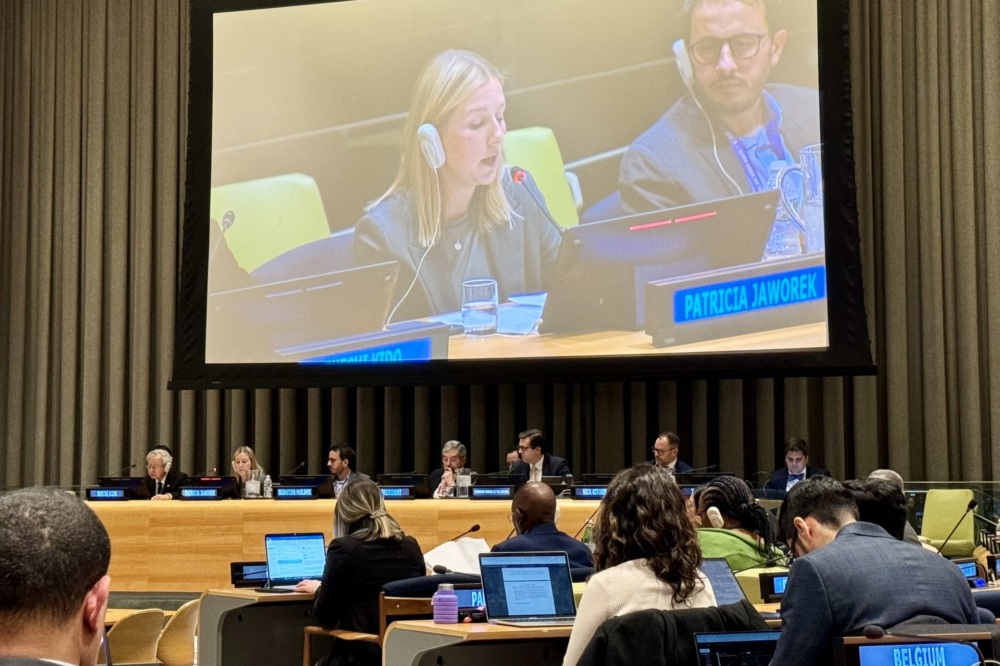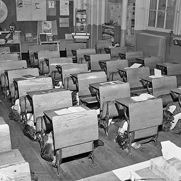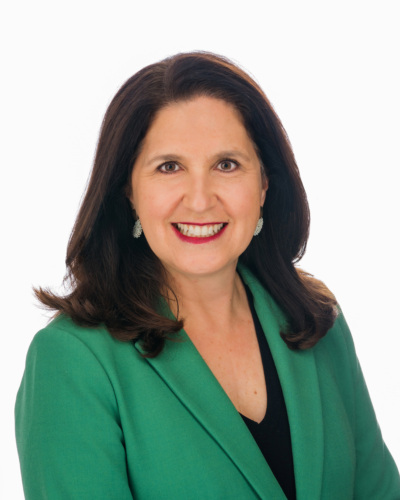What was it like to live through the Cuban Missile Crisis? Did you do “duck and cover” drills at school? Post stories or interviews with parents or grandparents on NTI’s Facebook page or send to [email protected].
Former U.S. Senator Sam Nunn, NTI co-chairman
"The 1962 Cuban Missile Crisis was Sam Nunn’s nuclear baptism. He was touring Europe with a group of fellow congressional aides as the showdown escalated. They all had security clearances and were briefed by American military commanders at the height of the crisis, with American and NATO forces set to strike the Soviet Union if war broke out. The tension, and possibility of a nuclear conflict, stunned Nunn, who was twenty-four years old.
"More than four decades later, Nunn still vividly recalled the crisis. He said an Air Force general at Ramstein Air Base in West Germany informed the group that he had less than a minute to get his combat aircraft launched so they would be out of harm’s way if the base, as expected, came under attack in the first moments of a war. The jet fighters were assigned one- way missions to deliver nuclear weapons to targets in the Soviet Union. (The planes lacked the range to fly back.) To ensure that the planes could take off quickly, pilots were ordered on several evenings during the crisis to stand by their aircraft.
"'That made a huge impression on me,' Nunn said. 'I decided at that stage if I ever had a chance to get into public life, I would. I didn't know at what capacity at that stage. And if I ever had the chance to try to do something to reduce nuclear dangers, I would, because I felt mankind was really at stake then. The future of mankind. So that was a formative experience for me.'"
From The Partnership (page 142)
John Endicott, President, Woosong University, United States/ Republic of Korea
Endicott was based at the Strategic Air Command (SAC), the organization in charge of U.S. land-based strategic bomber aircraft and land-based intercontinental ballistic missile (ICBM) strategic nuclear arsenal
“[My wife and I] arrived mid-year at Offutt Air Force Base… When I reported in to SAC, I was immediately detailed as a SAC Augmentee to the Joint Strategic Target Planning Staff (JSTPS) that actually made the master nuclear war plan… When President Kennedy spoke to the nation on television and the Defense Establishment went to DEFCON 3, our attention was focused…
"Then on one day of the crisis, it might have been the 24th when the entire U.S. Defense Establishment went to DEFCON 2, or the 27th, a day when all hell broke loose with a missing U2 and an errant U2, but I cannot remember for certain. However, things were very hot and tensions were extremely high. One of my bosses – it seemed as a Captain I had quite a few – came down from the Intelligence Directorate … and said, to the best of my memory, ‘Well men, I believe we have about 20 or 30 minutes until execution, why don’t you call your spouses and say good-bye.’ I am sorry I don’t remember the exact time nor date, but I do remember making the call and asking some non-descript question like, ‘What are we having for dinner?’…
“I can remember some years later being on an expert’s panel with Secretary McNamara and the subject of airborne alert came up. I said something very close to ‘Mr. Secretary, do you remember when we launched the fleet to avoid a Pearl Harbor during the Cuban Missile Crisis?’ He turned to me and said that he had never approved of such a move. I responded that he didn’t need to approve a protective launching of the fleet as that was authority designated to the SAC Commander in the protocols for emergency response. The color went out of his face and he stared at me in disbelief.”
Read the transcript of his full remarks
Former Secretary of Defense William J. Perry, NTI board member
"Perry was urgently summoned to Washington to lend a hand. 'I received a phone call asking me to come back to Washington to give some advice,' he recalled. 'I said, ‘Fine, I’ll change my schedule and be back next week.’ They said, ‘No, you don’t understand. We want you to come right away.’ So I took a night flight to Washington. The next morning I was taken into an analysis lab. I was stunned to be shown pictures of Soviet nuclear missiles…'
"For Perry, the peaceful resolution of the missile crisis left an enduring sense that nuclear war was just one miscalculation away. 'Every day I thought was going to be my last day on earth,' he said."
From The Partnership (page 102)
Jeannette Musser, Columbus, OH
I had heard on TV that Khrushchev had put all these missiles in Cuba and that Kennedy and his team were deliberating about what to do. A couple days later, I was doing a load of laundry in the basement of my home near Cleveland, OH, and I heard a big explosion outside. Immediately, I thought it was a nuclear explosion and ran up the stairs to look outside. Of course, it wasn't, but still to this day, I don't know what it was. I was afraid we'd been attacked. It was a very scary time.
Robert R. Johnson, Houghton, MI
I was in the fourth grade in Gary, Indiana when our teacher brought a radio into the room and said, "Children, there is a very important event going on between our President and the Premier of Russia. It has to do with the Russians trying to bring nuclear bombs to Cuba on ships."
She proceeded to turn on the minute-by-minute broadcast that was very graphic and alarming. The picture in my mind of these Russian destroyers pulsing through the ocean and preparing to deliver the misses that, I imagined, would be trained on the steel mills, railroads, and oil refineries of Gary and the surrounding greater Chicago area.
One young girl cried out, "I will never see my mother again!." Another vomited on the tile floor in the back of the room.
When it was announced that the ships were turning around, I clearly remember that there were no cheers or clapping. There was just a great silence. As I recall, the school buses came early that day.
I am the author of "Romancing the Atom: Nuclear Infatuation from the Radium Girls to Fukushima." (Praeger Press, August 2012). My web site is: www.romancingtheatom.com
Ray Osbourne, Somerset, NJ
At the time of the Cuban Missile Crisis, I was serving in the US Army in Japan with the Armed Forces Radio and Television Service (AFRTS). When President Kennedy's speech was announced, AFRTS arranged to carry it by shortwave (no satellites in those days).
All of the stations in Japan were told to monitor AFRTS Shortwave and VOA Shortwave to pick up the signal. Both organizations shared a transmitter farm in Delano, California. It is a fact of shortwave propagation, that one area could get a perfectly clear signal while just a few miles away, the station might just as well not be on the air. I sat in the Master Control Room of the station where I was located along with a Japanese engineer. I knew how the shortwave receivers worked just as well as he did. We went through a list of frequencies to determine which signal came in the best. This signal was fed down a return line to the headquarters in Tokyo. There, the signals from all the stations on the network would be fed and someone would make the decision as to which signal was the best and use it to feed the network.
It was an enormously tense time as we knew that we could easily be in the Russian cross-hairs should things get out-of-hand.
Marcus Wigan
Flash memory. Looking at a blue blue sky framed by the Sheldonian Library and All Souls College Oxford. Standing at the junction of Catte St and The High beside my girlfriend, later my wife. Thinking that this might be the last time we would see this vista…or any other.
Then off to the dentist, to have a four hour agony for a wisdom tooth removal without the modern pain killers. So appropriate.
Mark York
As a then 8 year old I remember Mom stocking up on can goods and water. She also bought a cow bell. She would stand on our back porch and ring it like crazy. Then all of us kids playing in the neighborhood would run home wondering if Nikita was dropping a nuclear bomb on us, right then. For a small child it was a very scary time.
My uncle in the Navy and his small destroyer were part of that "line" that the Soviet ships could not pass over. My mother was very worried about her baby brother!
Bill Warner, Captain, USNR (Ret.), Louisville, KY
A bit of levity in a double deadly situation: I was living in Louisville KY during the Cuban Missile Crisis. At the height of the crisis, a very popular – but, alas, long gone – local club and bar, Arts in Louisville, put out flyrers all over town which read, “In the event of nuclear attack, Arts in Louisville has been officially designated as a mass intoxication center!”
Dick Morten, San Francisco
During the Cuban missle crisis I was in the Coast Guard serving my six month reserve time at Government Island Alameda. All of a sudden we were issued rifles and other combat gear and told to have our gear ready to load on buses outside our barracks. Rumors were that if it got worse we would be taken by bus to safe areas outside of the Bay Area. Cutters and other patrol vessels were brought into Port where we loaded munitions, food, etc. onto peace time equipped ships. Some Coasties were added to the ship's crew to bring them up to a embargo status. We were glued to the TV.
Francesco Calogero, former Secretary Geneneral, Pugwash Conferences on Science and World Affairs
In October 1962 I was a quite junior Italian theoretical physicist, spending the year at the Physics Department, Princeton University. But my wife and myself were actually living in an apartment at the Institute for Advanced Study (IAS), sharing it with my parents—taking advantage of the fact that my father, a philosopher, had been invited to spend that year at the IAS. As it happened, we all decided to go one weekend en touriste to Washington. It was the crucial weekend of the Cuban Missile Crisis.
We watched the speach by President Kennedy on TV from a street…The event was an eye-opener for me. Until that time I had thought that, as a young scientist, I should concentrate full time on science. After that event, I began to read and get acquainted with nuclear arms control. When I returned to Italy the next year I realized that I was somewhat more knowledgable than most colleagues on these matters. This provided me with the opportunity to play a role way beyond my standing as a junior scientist on the debate in Italy—in the latter part of the 60s—over the issue of the signature by Italy of the Non Proliferation Treaty.
I also began to be involved in Pugwash, collaborating to the organization of the Annual Pugwash Conference that took place in 1965 in Italy. Then over time I became more and more involved in Pugwash, serving as Secretary General from 1989 to 1997, and from 1997 to 2002 as Chair of the Pugwash Council (of which I still am an ex officio member). I also served from 1982 to 1992 on the Governing Board of the Stockholm International Peace Research Institute (SIPRI). And I was one of the initiators—and still am an active member—of the Italian Union of Scientists for Disarmament (USPID).
Although I always continued to do science (even while serving as Secretary General of Pugwash), my activity in the field of arms control and disarmament has overall taken about half of my time and committment, and this pattern still continues. All this began—or at least was very strongly influenced—by that chance weekend in Washington…Peace
Robert Louden, PhD, Lakewood, NJ
Mine is a multi-part story! Some years prior to the Cuban Missile Crisis I was a student in a NYC parochial elementary school. We frequently did duck & cover drills; either under the desk or in the hallway, depending on the school building. We were even issued military type dog-tags. Related, when I was in a parochial boys high school from 1958-1962, several new students arrived; they had been evacuated from Cuba by the Catholic Church in Operation Peter Pan.
In October 1962 I was in college and one memory is that a few of our faculty members, who were also members of the Military Reserve and National Guard, were mobilized for the pending war. At the same time my future wife was a nursing student and subsequently a Registered Nurse at a Catholic hospital. It was not uncommon for older, new Resident Physicians to appear! They were accomplished Doctors in Cuba who left all behind to come to the US and were required to complete their training before they could practice medicine in the US.
Fast forward thirty years to St. Petersburg Russia at a Criminal Justice conference. Two interesting memories: 1) The Deputy Mayor of St. Petersburg, a retired Vice Admiral in the Russian Navy, informed a small gathering of us that he had visited the east coast shores of the US several times, through a periscope; and, later while we were socializing with a group of Russians we mutually discovered that while we were waiting for them to attack us, they were waiting for us to attack them!
Jerry Burns
An excerpt of a report from the Associated Press:
"My crew was on alert duty when (we) went to DEFCON 2 — the only time that ever happened," retired airman Jerry Burns remembered of that night.
"The Missile Combat Crew Commander and I were on the console and decoded that alert message from SAC Headquarters. It went something like: 'Skybird, Skybird. This is Looking Glass with a Red Dot Two message," Burns said. "Holy mackerel! This was the real thing."
Burns was assigned to Launch Crew 43 of the 577th Strategic Missile Squadron out of Altus Air Force Base. The 577th manned 12 Atlas missile silos built in a circle around the Oklahoma air base.
One of those silos was in Texas — No. 5 — buried in a pasture near Odell on FM 91, three miles south of the Red River.
"Yes," Burns said, he thought there would be war. He believed it so much that his crew was making plans for bringing their families to the missile silo. That idea was "squelched" by command, Burns said, when the plan instead was made to reload the silos.
"We were just one more button, and two minutes away from WWIII. You could have cut No. 10 washers off my sphincter for a month after that experience. I guess the world will never really understand how close we came that night," he said…





